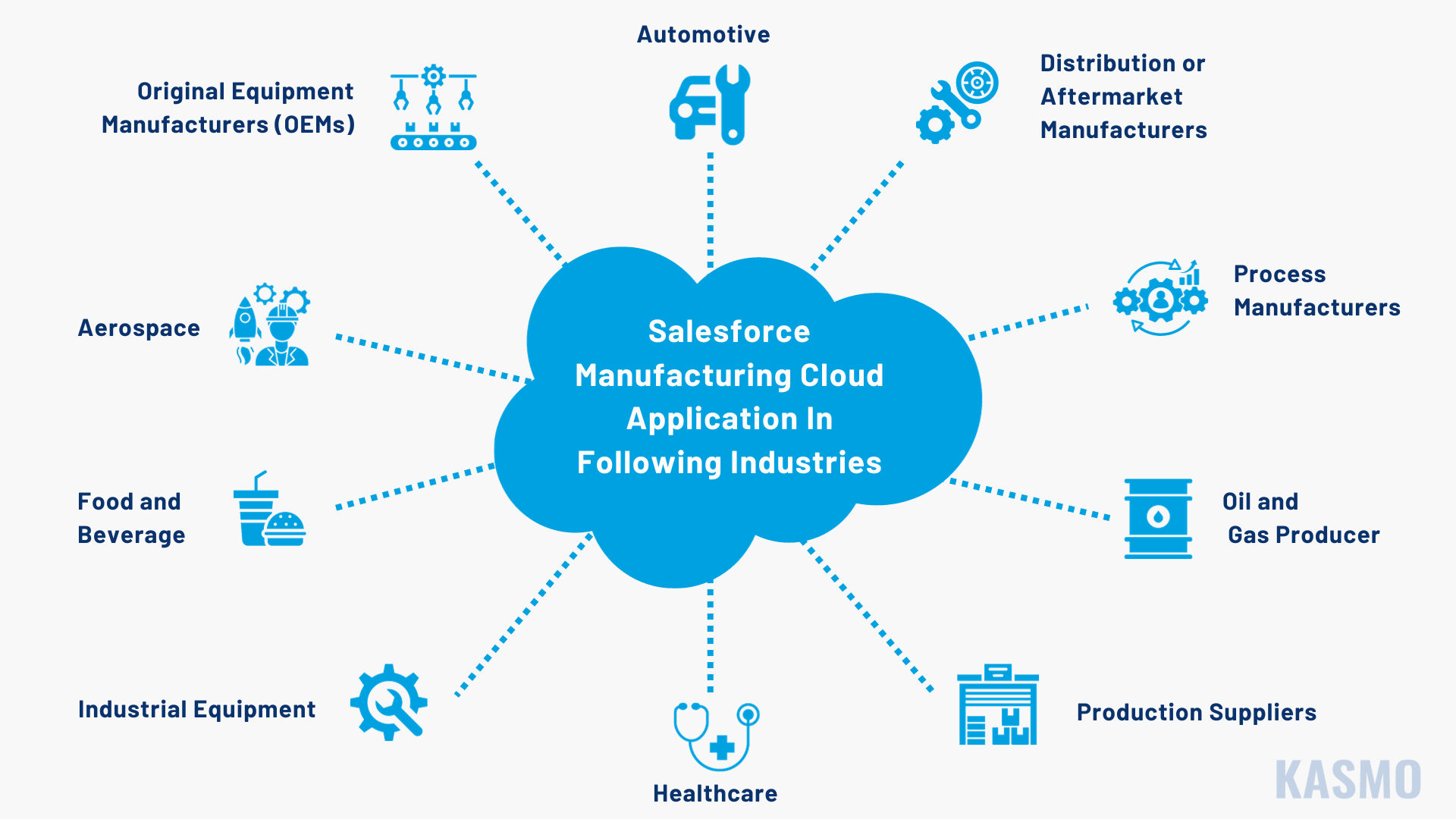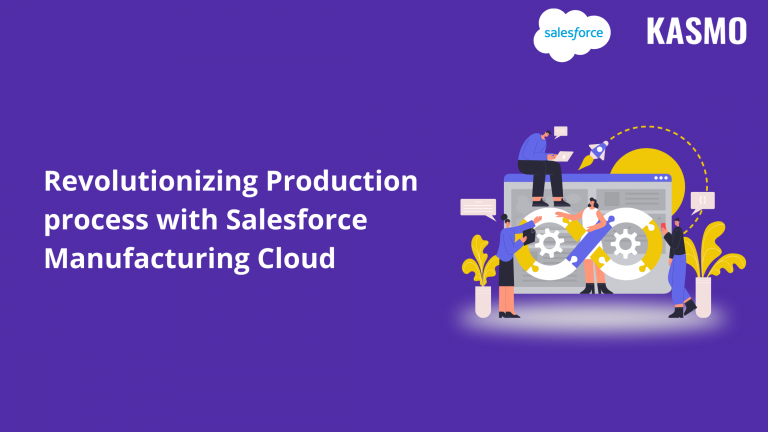The rapidly growing manufacturing industry offers business opportunities to entrepreneurs. But manufacturing Industry challenges are numerous from managing complex supply chains and fluctuating demand to optimizing production processes and ensuring customer satisfaction. Outdated technologies and manual processes are no longer efficient. Salesforce, a leading CRM platform, has introduced Salesforce Manufacturing Cloud for manufacturing industries to implement operational changes faster to overcome these challenges.
What is Salesforce Manufacturing Cloud?
It’s a customer relationship management tool specifically designed to the requirements of manufacturing companies to overcome manufacturing industry challenges. It was launched in 2019; this platform helps to modernize and secure manufacturing company’s entire operations.

Features of Salesforce Manufacturing Cloud
1. Sales Agreements
Sales agreement feature helps both manufacturers and customers keep the terms and conditions organized and get the most recent updates on the agreed terms. This agreement covers updates such as product data, number of quantities required, product pricing, schedule, and product delivery. It also covers responsibilities, compliance rules, variations, and uncertainties in demands and supplies. This feature also monitors the revenue generated by the industry. It helps to improve customer relationships by aligning the sales and operations team with updated data.
2. Account-Based Forecasting
It provides a platform for a unified view of data for all departments. Sales, production, finance and planning teams can collaborate in real time to forecast sales agreements and business opportunities more precisely. This feature avoids confusion within the enterprise for forecasting as it provides a unified and single source of data. The formula builder used in account forecasting considers different factors according to business requirements that influence forecasting and determine the forecast algorithm.
3. Community Cloud for Manufacturing
Community cloud is a feature of this platform where customers and channel partners can interact. Digital collaboration ensures transparency between stakeholders accelerating planning. In the traditional manual process, a lot of time was wasted on explanation, clearing doubts and reporting about client updates. Using the community cloud gives real-time visibility on all this and increases productivity.
4. Einstein analytics for manufacturing
To make informed decisions, business insights play an important role. Einstein analytics helps manufacturing industries gain insights on product performance, sales and pricing. This feature adds intelligent insights, predictions and recommendations to the day-to-day operations of businesses. Team performance can be evaluated using the target dashboard against the revenue generated. Based on this information, changes can be implemented according to the business requirements.
Benefits of Salesforce Manufacturing Cloud to overcome manufacturing industry challenges:
1. Streamlines business:
It streamlines business by connecting different departments. By connecting sales and operating departments, sales orders can be submitted instantly and automatically, reducing human errors. Automation creates reliable data for these two departments to work together.
2. Accurate Business Prediction:
Access to the various reports instantly helps management make better decisions. Reports help management determine the sales of each product and detect which product brings more profit and which product has higher return rates. Based on these reports, business trends can be determined to allocate resources to the products to be manufactured.
3. Streamlined Resource Management:
Manage resources properly according to product demand. If companies produce products beyond the estimated demand, they incur losses. If they produce less, they miss revenue opportunities. Salesforce Manufacturing Cloud enables the management of customer demand and resources.
4. Instant contract updates:
It has contract management features for automation, any changes to existing agreements with clients can be made instantly. All the updated information is stored in a unified platform to avoid confusion, which can be accessed by all who have access to it.
5. Track leads and improve conversion rates:
This platform can track leads automatically. Businesses can also make informed decisions based on sales performance, like what should be improved. Sales strategies can be updated to improve conversion rates by correcting problems according to prospective customers.
6. Lower Costs and Scalable Platform:
It can handle every task and reduce dependency on multiple platforms that may use outdated technologies.
Salesforce Manufacturing Cloud for Service
Manufacturing Cloud for Service helps Organizations manage customer service in a smarter way. It allows organizations to solve problems for their customers, automate tasks, handle warranties, get feedback from customers, and predict how much revenue they make from services and spare parts.
Benefits of Salesforce Manufacturing Cloud for Service
Here’s how it makes customer service easier for organizations:
- Unified Service Console: Organizations will get a special dashboard for customer service that gives your team a complete 360 view of customer interactions. This helps their customer service representatives (CSR) respond faster and solve problems better, giving customers a consistent and personalized experience.
- Warranty Management: organizations can make sure their products last longer and keep customers happy by managing warranties more efficiently by creating an end-to-end scalable warranty management. This involves setting clear service standards, handling warranty claims from partners, and making the process smooth.
- Revenue and Parts Forecasting: It can predict how much money organizations can make from services and know how many spare parts you’ll need by using a flexible forecasting system.
- Feedback Collection: Organizations can gather feedback from customers through surveys. This helps them understand what customers think and gives useful information to improve their services.
Steps in Salesforce Manufacturing Cloud Implementation:
- Define Goals and Objectives: To start with, define the objective for implementing Salesforce in manufacturing. Kasmo’s Salesforce solutions helps to overcome manufacturing industry challenges, identifying their requirements and suggest appropriate features, editions, and adoption strategies aligned with their business objectives.
- Stakeholder’s decision: Consider key stakeholder’s decisions from different departments, like sales, finance and the operations team, regarding Salesforce Manufacturing Cloud implementation.
- Plan Data Migration and Data Integration: Come up with a plan for data migration from the existing system to Salesforce Manufacturing Cloud platform. Also consider how different elements like customer data, sales data, product data and order data are related to each other for smooth data integration and migration.
- Customize the Platform: Customize the platform according to your business requirements. Kasmo’s implementation strategy is quick, easy and customized to meet enterprises’ requirements, resulting in faster go-to-market releases.
- User Adoption and Training: Companies should provide training, tutorials and support to the platform users so that they can utilize it more effectively.
- Prioritize Security: It’s a platform for managing sensitive customer data and operation data. Therefore, it should agree with all the security measures. Protect sensitive data with data encryption controls and compliance certifications such as ISO 27001.
Salesforce Manufacturing Cloud is a powerful tool that can help manufacturers to overcome Manufacturing industry challenges and achieve significant competitive advantages. Kasmo provides Salesforce implementation services, helping manufacturing companies create more efficient, connected, and customer-centric organizations with Salesforce Manufacturing Cloud platform. This helps organizations establish long-term success.
Looking to implement Salesforce manufacturing cloud to streamline your business? Connect with our experts for more information.

